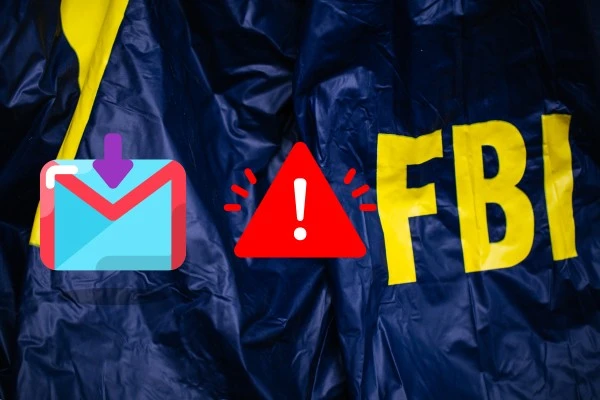In an age where artificial intelligence (AI) is transforming industries, it is also being exploited by cybercriminals to launch highly sophisticated attacks.
The Federal Bureau of Investigation (FBI) has issued a critical warning to Gmail users, urging them to remain vigilant against AI-powered phishing scams that are growing increasingly deceptive and effective.
These advanced attacks can bypass traditional security measures, putting millions of users at risk of data breaches and identity theft.
Ai Phishing Alert – Here’s How to Protect Yourself Before It’s Too Late!
Phishing scams are not new, but AI has taken them to unprecedented levels of sophistication. Cybercriminals are leveraging AI tools to craft emails that are nearly indistinguishable from legitimate communications.
These fraudulent emails replicate the branding, tone, and structure of trusted entities such as banks, tech support teams, and online retailers.
By mimicking these organizations with uncanny precision, scammers deceive even the most cautious users into revealing sensitive information.
According to the FBI, AI-generated phishing emails are designed to extract confidential data such as usernames, passwords, financial details, and Social Security numbers.
Once hackers gain access to a Google account, they can exploit stored emails, cloud files, and personal contacts, amplifying the potential damage.
Recent findings from Hoxhunt, a cybersecurity firm, reveal that phishing attacks capable of evading email security filters have surged by 49% since 2022.
Alarmingly, nearly 4.7% of all phishing threats now incorporate AI-driven techniques, making them harder to detect and counteract.

Why Gmail Users Are High-Value Targets
With over 1.8 billion active users worldwide, Gmail is one of the most widely used email platforms. Many individuals use their Gmail accounts as gateways to online banking, shopping, and social media, making them prime targets for cybercriminals.
Experts from cybersecurity firm VIPRE highlight that 70% of phishing attacks involve malicious links. These deceptive links often redirect users to fake login pages designed to steal credentials or deploy malware.
AI-driven phishing techniques further enhance the effectiveness of these attacks by personalizing messages based on information scraped from social media, increasing their credibility.
Key Warning Signs of AI-Powered Phishing Attacks
To help users identify and avoid phishing scams, the FBI has outlined several red flags:
- Unexpected Emails or Messages: Be wary of unsolicited emails requesting personal information. Legitimate organizations rarely initiate contact this way.
- Slight Variations in Email Addresses: Scammers create deceptive email addresses resembling official ones, such as “support@g00gle.com” instead of “support@google.com.”
- Suspicious URLs: Hover over links before clicking to check their authenticity. Malicious sites often mimic real ones with minor differences.
- Urgency and Fear Tactics: Phishing emails commonly create a sense of urgency, warning of account suspension or financial loss to prompt hasty actions.
- Attachments from Unknown Senders: Avoid opening email attachments from unfamiliar sources, especially with vague or generic subject lines like “Invoice Attached” or “Important Document.”
- Personalized Yet Generic Content: AI-powered scams can include personal details, but inconsistencies in language or formatting can expose their fraudulent nature.
Strengthening Your Gmail Security: FBI Recommendations
While no security measure is foolproof, adopting proactive steps can significantly reduce your exposure to phishing threats. The FBI recommends the following:
- Enable Multi-Factor Authentication (MFA) Adding an extra layer of security, such as an authentication app or biometric verification, makes it significantly harder for hackers to access your account.
- Independently Verify Requests If an email asks for sensitive information, verify the request by contacting the organization directly through its official website or phone number.
- Beware of Unsolicited Phone Calls Cybercriminals may follow up phishing emails with phone calls posing as customer service agents. Always verify such claims through official channels.
- Regularly Update Passwords Use strong, unique passwords for different accounts and update them periodically. A password manager can help store and generate complex credentials securely.
- Monitor Your Online Presence Be mindful of sharing personal details online, as attackers can use this information to craft more convincing phishing emails.
- Stay Informed and Educate Others Keeping up with cybersecurity trends and educating friends and colleagues about phishing threats can strengthen collective digital safety.
The Bigger Picture: A Rising Cybersecurity Crisis
The rapid advancement of AI-driven cybercrime is a growing global concern. According to cybersecurity firm Proofpoint, email fraud attacks surged by 61% between 2022 and 2023, with phishing attempts accounting for nearly 90% of all data breaches.
Tech giants and regulatory bodies are ramping up efforts to combat this crisis. Google has implemented enhanced machine learning algorithms to detect and block phishing emails before they reach users’ inboxes.
Additionally, governments worldwide are advocating for stricter anti-phishing regulations and awareness campaigns to curb the rising threats.
Final Thoughts: Stay One Step Ahead
As AI technology evolves, so too do the methods employed by cybercriminals. Gmail users must remain proactive and informed to protect themselves from increasingly sophisticated phishing scams.
By following the FBI’s recommendations and staying alert to red flags, you can safeguard your personal and financial information.
Cybersecurity is an ongoing battle, but awareness and caution are your best defenses. Stay vigilant, trust your instincts, and verify before you click—because in the digital world, prevention is always better than a cure.










